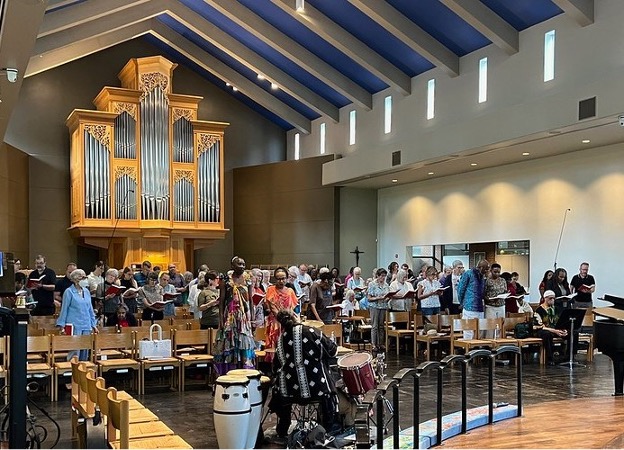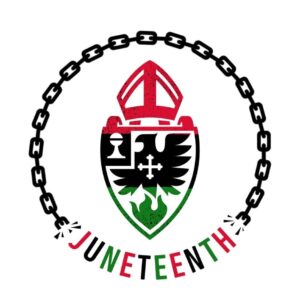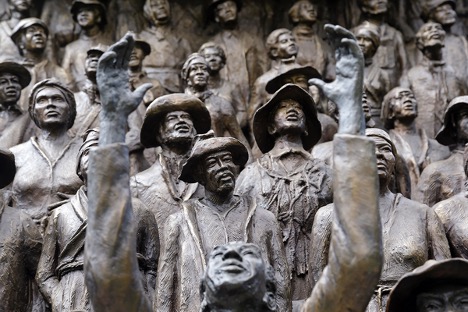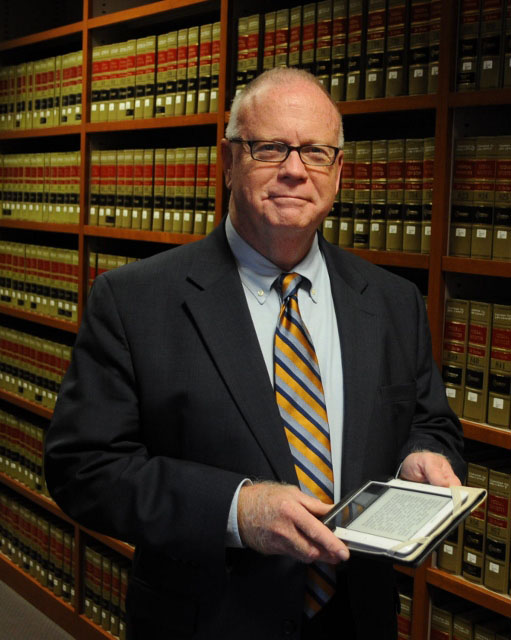
St. Bartholomew’s Concert of African American Spirituals in Celebration of Juneteenth.
On the Sunday afternoon before Juneteenth, the nave of St. Bartholomew’s Episcopal Church was filled with joyful sound.
The musical celebration of freedom included the parish choir, solos, spoken word, piano, drum, saxophone, and of course the parish’s beloved Rosales organ.
Musicians were Phyllis Adams and Lelia E. Boldenof, Song Rise To Thee; Kimberly Waters, Flute, and Voice; Ralph Jones, Saxophone; Stephen Frketic, Organ; and The Choir of St. Bartholomew’s. The congregation sang from the Lift Every Voice and Sing hymnal.
St. Bartholomew’s Rector Angela Shepherd did not speak during the Concert of African American Spirituals but discussed the importance of the event to the parish in an interview with Connecting News.
“This year is the 158th anniversary of Juneteenth so this is an important part of American history that here at Saint Bartholomew’s we could not let pass us.
“The church needs to be engaged, involved in seeing everyone as people of God – and expressing solidarity with what’s happening in the culture. At St. Bartholomew’s we’ve had focus on dismantling racism since 2018, so having the second annual concert just becomes something else that’s a part of what’s important to us.
“Three years ago, in the aftermath of the public murder of George Floyd, we made a banner saying Black Lives Matter, We Can Do Better, We Will Do Better and hung it in front of the church. So, this annual concert is in line with other things that we have been doing.
“This particular concert brought in people who are members of the church and the community. It was just great to draw people together to sing spirituals and to be connected in that way. We are going to have the 3rd annual one next year so this is going to become a tradition at Saint Barts.”
On the state of freedom in America and what the church can do to play a part in freeing people, Shepherd said black and brown children are being targeted as potential prisoners.
“First of all, freedom is never free. Freedom comes with some sort of responsibility,” she said.
After attending a webinar entitled From Emancipation to Mass Incarceration that focused on the mass incarceration epidemic faced primarily by black and brown people, Shepherd said churches must step into the breech.
“I think finding ways to interrupt the school-to-prison pipeline should be a priority of people of faith because prisons are an industry; an industry that is looking at people as though they are products.
“They are assessing the number of African American boys in the second or third grade and then projecting how many prisons are going to be needed in the future. That is a sign that the remnants of chattel slavery are still here.”
Shepherd said churches should find ways to be supportive of people living with poverty and try to build relationships with them so that there are other alternatives.
“We must make sure that [children of color] are not cast as simply another anticipated incarcerated person, but so they can live into their full humanity of God and participate in the society. We must make Juneteenth not just a one-time celebration but a springboard to actually doing some work,” Shepherd said.

Diocese of Atlanta Juneteenth social media image.
The Diocese of Atlanta each year draws attention to Juneteenth by temporarily changing its social media image in honor of Juneteenth.
Diocesan Bishop Rob Wright said such recognition and parish celebrations of Juneteenth are a way of drawing attention to the story of America.
“Celebrating Juneteenth makes perfect sense as an American. It tells the truth about our complicated American family story and points us toward “…liberty and justice for all.”
On a June 2022 episode of his podcast Bishop Wright said, everyone should celebrate Juneteenth.
“I am not diminished by celebrating you in all of your particular wonderfulness. Funny enough, my dignity swells as I affirm your dignity. And my dignity dissipates as I, by omission or commission, participate in your diminishment. God rejoices when we celebrate the truth – that we were made for each other and for God’s glory.”
Juneteenth (a combination of June and 19th) commemorates the last of America’s enslaved people being declared free. That was in 1865, two years after the Emancipation Proclamation was signed, when Union soldiers led by Major General Gordon Granger came into Galveston, TX and he announced that the war was over and that all enslaved people were free.
In an interview on Georgia Public Broadcasting Dr. Catherine Meeks, founding executive director of the Absalom Jones Episcopal Center for Racial Healing, said Juneteenth is a time for deep reflection.
“Juneteenth is an opportunity for us to really begin to think about what freedom means,” Meeks said. “What does it mean for people who have been enslaved? What does it mean for people who have been the enslavers? And what does it mean for all of us who are living in this country now?”
The Federal holiday established in 2021 is an opportunity for Episcopal communities to center on the story of the continuing search for freedom for all people.
In the Diocese of Atlanta St. Bartholomew’s was joined by other parishes in marking the special day of remembrance and for looking toward a more just world.
St John’s, College Park; Church of the Incarnation, Atlanta; and Hillside International Truth Center celebrated Juneteenth “Freedom Sunday” with a service at Incarnation followed by lunch on the grounds. There was also a “Banned Bookshop” on site for people to purchase or donate banned books.
At St. Paul’s Episcopal Church in Atlanta the Juneteenth Celebration featured guest speaker, the Rev. Dr. Gayle Fisher-Stewart, who is the founder of the Center for the Study of Faith in Justice at Calvary Episcopal Church in Washington, D.C. It also included music by the St. Paul’s choir and a reception.
Episcopal churches throughout the nation celebrated Juneteenth with special services, events, and activities that commemorate the end of slavery in the United States and honor the culture and history of African Americans.

Episcopal Churches in Warren County Mississippi gathered at St. Mary’s Episcopal to celebrate Juneteenth.
St. Mary’s Episcopal Church in Vicksburg, Mississippi held its first Juneteenth service on June 13 with readings, prayers, hymns, and a sermon that reflected on the meaning and significance of the holiday.
The Episcopal Diocese of Newark hosted half-day pilgrimages to sites in the diocese with a historical link to slavery on June 17 and 19. The pilgrimages included visits to churches, cemeteries, monuments, and museums that tell the stories of enslaved and free African Americans in New Jersey.
The Episcopal Diocese of Missouri organized a Juneteenth celebration on June 19 at Christ Church Cathedral in St. Louis. The celebration featured a worship service with music, dance, poetry, and preaching by Bishop Deon Johnson, followed by a festival with food trucks, vendors, games, and live entertainment.

Bronze figures look out from the Texas African American History Memorial on the grounds of the Texas Capitol in Austin, Texas. The monument, erected in 2016, traces the history of African Americans in Texas from the 1500s to the present. The central portion of the memorial, by sculptor Ed Dwight, depicts the original Juneteenth in Texas in 1865. Photo: Associated Press.
The Episcopal Diocese of Texas partnered with other faith communities to host a Juneteenth celebration on June 19 at Emancipation Park in Houston. The celebration included a march, a prayer service, a concert, and a picnic. Emancipation Park was founded in 1872 by four former slaves who pooled their money to buy land for the first public Juneteenth celebration in Houston.
Though Juneteenth has been recognized in the black community since 1865 it wasn’t until two years ago when it finally became a Federal holiday when President Joe Biden signed it into law in his second year in office.
Now, Juneteenth is becoming a widely celebrated holiday with red, green, and black flags waving in the wind and parades and festivals with marching bands, dancers and more.
Many Black families have their own stories about Juneteenth. In this article Atlanta resident and New York Times Opinion columnist Charles M. Blow writes about his family connection to Juneteenth.
Join the Work
The Episcopal Diocese of Atlanta is actively involved in combatting racism, poverty, and mass incarceration through various ministries and initiatives. Here are some examples:
– The Absalom Jones Episcopal Center for Racial Healing is an intergenerational, faith-based organization that provides curriculum, activities, and experiences so participants can engage their heads and their hearts in the daily work of dismantling personal prejudice and ending systemic racism.
– The Church of the Common Ground is a “church without walls” on the streets of Atlanta that provides support for the pastoral and spiritual needs of women, men, and youth who live on the margins of our city. The Church of the Common Ground welcomes people of all faith backgrounds as well as those who seek a new connection to faith.
– Emmaus House is a resource that helps families move toward economic self-sufficiency using a two-generation approach to address the needs of the entire family – children and parents together – so they can experience academic achievement and sustained economic success.
– Holy Comforter Church & Friendship Center is an inclusive community that promotes the mental, physical, and spiritual well-being of adults marginalized by mental health challenges and poverty. This ministry offers programs such as Greenhouse and Gardening, Wellness and Recovery, and Recovery through the Arts and Food.
– The Multifaith Movement to End Mass Incarceration is a national initiative that leverages spiritual power, people power and faith community resources to end mass incarceration in the United States. The Diocese of Atlanta is partnering with interfaith partners on this initiative to catalyze a faith-rooted response to the issue in a way that adds value to existing work and furthers coherence in faith-rooted efforts.

